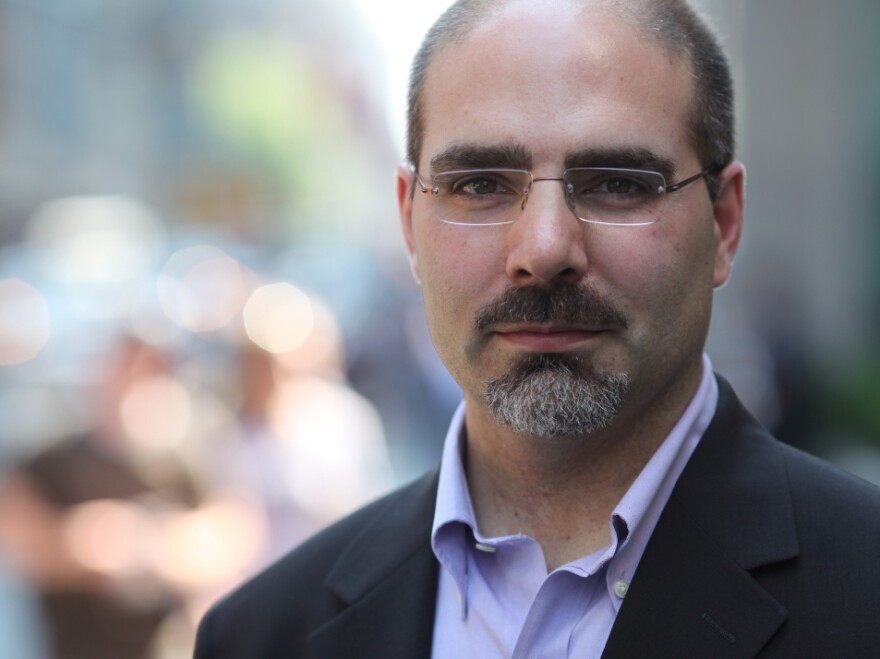Jon Michaud's first novel, When Tito Loved Clara, follows the intersecting stories of its title characters: former high school lovers, both immigrants from the Dominican Republic who grew up in Inwood, or, as Michaud writes, "the forgotten part of Manhattan."
When the story begins, the two have been separated for nearly 15 years after trudging different paths in adulthood. Clara escapes the old neighborhood, leaving behind an alcoholic father and abusive stepmother for the suburban bliss of a colonial-style home in the New Jersey suburbs — complete with a white husband, loving son and the kind of steady job set aside for ambitious people with college degrees. Tito lives in his parents' basement in the apartment he'd sneak back to after trysts with Clara in Inwood Hill Park all those years ago, working for the same moving company that occupied his afternoons and weekends in high school.
This immediate lack of middle ground makes of Clara and Tito typologies, predestined archetypes one would expect to find in a naturalist like Theodore Dreiser. Even as Michaud gives them a rich, complicated history, their functions are clear. Clara is the assimilated American; Tito the poor immigrant. The novel exists for the purpose of complicating these roles.
Clara's family acts out, in the words of her husband, Thomas, "every cliche about Latino immigrants." Clara's sister Yunis leaves her in charge of her 16-year-old daughter Deysi, pregnant with Yunis' boyfriend's baby (Yunis doesn't know this yet). The boyfriend, Raul, is a tough guy who did time in Rikers for selling drugs and now works with Tito at the moving company (though Clara is unaware of that detail).
As Clara attempts to remain outside of the stereotype her family forces upon her, she and her husband deal with a typical set of problems plaguing modern white middle-class domesticity: Thomas, recently unemployed, is bored and cheating on Clara with a wealthy young widow. Clara is trying to get pregnant with a second child but is unable, she feels because of past wrongdoings. She goes through a series of expensive, invasive tests and fertility treatments.
Meanwhile, Tito's relative squalor — both financial and otherwise — is buffered by his sensitivity and the seriousness with which he takes himself. He is Raul's antithesis. He still actively desires the life he could have had with Clara, not to take the place of Thomas as the well-off suburban husband and father, but rather to brighten his days spent alone in the old neighborhood.

Michaud, the director of The New Yorker's archives, writes with a librarian's sense of perfectionism. Each chapter's narration is focalized through a particular character's perspective, and the only overlap is when one character retells a given scene from a different point of view. This meticulous organization initially raises the stakes of the story — as the story rushes forward, we know Tito and Clara will have to confront one another — but it somewhat weakens Michaud's writing. At times, Michaud will sacrifice style in favor of plot, at one point dismissing what could be a lovely metaphor of New York into a frail simile: The city was "like heaven or the moon." The collision of Tito's narrative with Clara's is so precisely structured, we can even predict exactly what doomed conclusion awaits the participants.
But that is also part of the point. Like Dreiser's Sister Carrie, the tragedy comes when all parties involved realize there is no escaping fate, whether good or bad. Michaud hints at this in his epigram, from Thomas Lynch's The Undertaking: "If you love, you grieve and there are no exceptions — only those who do it well and those who don't."
In Michaud's universe, there are no in-betweens. A person can succeed at changing his position, change one fate into another; or he can fail, and find himself living an existence that belongs more to the past than the present. Life will make some suffer while others prosper, but everyone will always end up wanting more.
Copyright 2023 NPR. To see more, visit https://www.npr.org.


